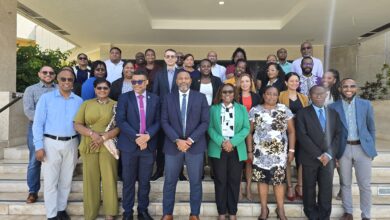(CARICOM Secretariat, Turkeyen, Greater Georgetown, Guyana)
Remarks by the Secretary-General
Caribbean Community (CARICOM)
Amb. Irwin LaRocque
At the Opening Ceremony
Of the Twenty-Seventh Inter-Sessional Meeting
of the Conference of Heads of Government
of the Caribbean Community (CARICOM)
February 15-17, 2016
Placencia Hotel, Belize
![]()
It is my pleasure to welcome you all to the Twenty-Seventh Inter-sessional Meeting of the Conference of Heads of Government.
At the outset, I want to thank the Government and people of Belize for providing such a beautiful setting in which to hold this meeting. There is no doubt that our surroundings allied to the generous hospitality, give us every opportunity to conduct our affairs successfully.
Prime Minister Barrow, the care that you have taken to provide such an environment is indicative of the value you place on our integration movement and your dedication to the task of advancing it during your Chairmanship.
I offer heartiest thanks and profound appreciation to your predecessor as Chair, the Rt Honourable Freundel Stuart, Prime Minister of Barbados. Prime Minister, you led our Community brilliantly through an intense period of activity, particularly in the international arena. I thank you sincerely.
It is also my pleasure to welcome Dr. the Honourable Keith Rowley, Prime Minister of Trinidad and Tobago to the Conference of Heads of Government. I congratulate him on his election. I have no doubt that his vast experience in government will serve our Community well as he brings it to bear in his contribution to the deliberations of the Conference.
In addition, since we last met, three of our Heads of Government have been re-elected. I extend congratulations to our Chairman, Prime Minister Barrow on his re-election last November for an historic third consecutive term; to Dr. the Honourable Ralph Gonsalves, Prime Minister of St Vincent and the Grenadines, the longest serving member of this the “supreme Organ of the Community” and His Excellency Desiré Bouterse, President of Suriname, on his second term of office.
Mr Chairman, over the next two days, you and your colleague Heads of Government will be considering some of the issues which are currently impacting upon our Community. Given the dynamics of the global situation, some of these issues emanate from outside our borders but have a direct effect on our economic, environmental and social life. Such situations, while challenging, present us with further opportunities to strengthen our unity and generate a collective response.
It is that unified action along with hard work and a co-ordinated approach which fashioned a successful outcome for our Community at the Climate Change Conference, COP21, in Paris last December.
We were well prepared due to the excellent work of our Task Force on Sustainable Development, under the chairmanship of Dr. the Honourable James Fletcher of Saint Lucia and our negotiators. The people of the Region rallied with us and provided valuable support, particularly from civil society and the youth.
The forces were well led by Prime Minister Stuart, and the Lead Head of Government for Sustainable Development, Dr. the Honourable Kenny Anthony, Prime Minister of Saint Lucia. We provided the political leadership within SIDS and the moral leadership globally on this issue. CARICOM was a united force and it produced beneficial results for our Community.
That approach should be our guide in the next phase of seeking to take advantage of the opportunities created under the Paris Agreement to address the impact of climate change. It is imperative that the urgency for action be translated into the efforts at acquiring the resources necessary to adapt to its effects in our Region and to ensure our survival. In that regard, it is crucial that the international community honour the commitments to provide the requisite resources.
We must maintain the standard set for how we should act in concert to address other challenges. That proven capacity for collective action which brings success has to be mustered as we engage frontally, the challenge posed to our security.
All of our Member States are affected in varying degrees as the scourge of crime threatens our societies, our economies and our citizens’ security.
It is imperative that we take action as a Region to stymie the efforts of those who seek to destroy our well-earned reputation as safe and secure societies. As we move to enshrine Security as the fourth pillar of integration in our Treaty, it is important that we demonstrate our resolve by formalising the regional legal framework and supporting institutional infrastructure that would help us fight the menace of crime and threats to our security.
Mr. Chairman, today, our Member States face yet another existential threat and it is immediate. This arises from the withdrawal of correspondent banking services due to the arbitrary and unsubstantiated categorisation of our Region as a financial high risk area. This is despite our jurisdictions being in compliance with the institutional and regulatory standards established by the FATF, the Global Forum and other international bodies.
Yet the global banks have reacted to the heightened regulatory emphasis in their own jurisdictions with de-risking strategies which either result in the withdrawal of correspondent banking relationships or restrictions on those services. Our Region is inarguably one of those most adversely affected by these de-risking strategies and our people have already begun to feel the consequences of such arbitrary decisions.
This situation threatens the financial and economic stability of our Region. It is having an impact on the ability of our people to receive their remittances and transfer their funds for trade and investment transactions.
This state of affairs demands that we act collectively to address this issue with the relevant regulatory authorities and the international community.
At this time, we are also grappling with the Zika Virus in some of our countries and the potentially devastating effects on the people of our Community. Our specialised CARICOM Institution, the Caribbean Public Health Agency (CARPHA), has been at the forefront working with Member States and other institutions in dealing with this challenge as it did with Chikungunya.
The Agency has been discharging its responsibility purposefully and professionally, providing laboratory testing services and sharing its expertise at both the national and regional level.
There are other matters that the Conference will be considering at this meeting. These include issues with respect to our borders and Associate Membership. The issues that have been raised in the context of our borders require careful assessment as we seek to safeguard the interest of our Member States and the Community at large. We also have before us the report of the Technical Working Group on the matter of Associate Membership which requires the Conference to give direction on the way forward.
Mr. Chairman, it is clear that our Community is working for us but we must ensure that we improve our efficiency and responsiveness. It is that imperative which is at the core of the Community’s Reform Process. The Reformation which we have embarked on, while necessarily starting in the Secretariat, has begun to cascade out to the Community Institutions as well as the Organs and Bodies of the Community.
This Reformation is not merely about cosmetic change where we tweak or adjust a few processes. It is transforming the way we do business in the Community and will enhance the delivery of the benefits of integration to our people.
A vital factor to drive the success of this initiative is the valuable contribution of the CARICOM Committee of Ambassadors. The work of the Ambassadors has proven beneficial in further advancing the Community’s agenda.
Mr Chairman, Heads of Government, Distinguished Delegates, the Caribbean Community has demonstrated time and again that it has the resolve, the capacity and the resilience to maintain the course of integration. We have done so, aware that it is the only path that would provide a viable, prosperous and sustainable society for our people to enjoy. The deliberations over the next two days will advance that process.
I thank you.





